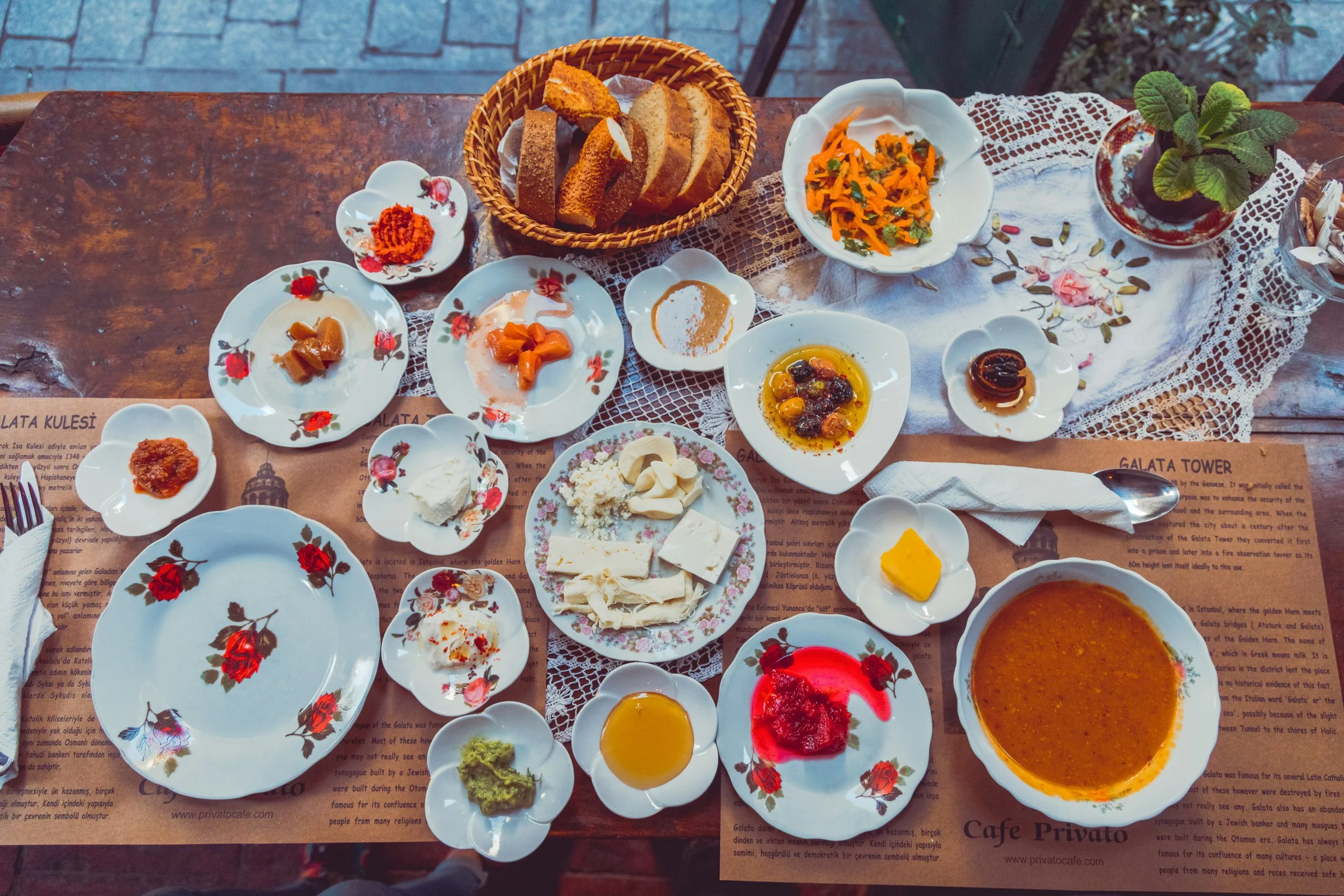Feasting
Currently the first thing I do in the morning is sit down in my big, comfy chair with my hot cup of coffee, light a candle, and spend five minutes imagining myself eating on the beach with Jesus. I started this practice at the beginning of the year, and since then both Father God and the Holy Spirit have joined us at the beach breakfast. I come to the table sleepy and sometimes exhausted, but the three of them in my imagination are always jolly, kind, and fully present. Mostly when I sit down they’re already laughing and enjoying each other, happy to see me join the party. Sometimes other people join as well, but for the most part it’s just us, and it feels like when I would sit with my mom and her sisters and soak in the joy as they laughed and carried on. A morning feast with the trinity feels like hope and home and comfort all rolled into one — it feels like family.
While this view of morning feasting is lovely, I think the idea of creating a feast can stir up a stressful reaction; anyone who has hosted Thanksgiving can tell you this. Concocting classic dishes for a flurry of people often feels overwhelming and like the opposite of joy, and it's because of this that Thanksgiving is one of my least favorite holidays. Thanksgiving food feels stuffy and regurgitated and stale; I would rather have been sitting at my grandma’s house over a simple meal of spaghetti, laughing with her and my mom about something random. To me, feasting is simpler than what we’ve made it out to be. It is brunch on Christmas Day, an easy meal of scrambled eggs and bacon and cinnamon rolls thrown together while dancing around the kitchen and sipping coffee. Feasting is hot dogs and s’mores made over an open fire with my in-laws, everyone watching the kids play in the hose and hoping they don’t try to shoot us with their water guns (they will). Feasting is the bi-weekly potluck with my small group, everyone bringing way too much food and all of us sharing about the ups and downs of our past week. For me, feasting has always been about the company we keep.
My husband’s family owned a restaurant when he was in high school, but when he talks about it he doesn’t talk about the food so much as the people. He still runs into staff members he worked with, waiters and cooks, and he still remembers the details of their lives. When they would close up for the night, sometimes they would stay afterward and play cards, laughing and talking and eating the leftovers of the day. What his family created was not just a place to eat, but a place of feasting — two entirely different things. Eating is necessary for survival. Feasting is a foretaste of heaven. Feasting is about good food, yes (and an abundance of it), but food is mostly the backdrop for communal joy: laughter and fun and intimacy and shared dreams. Food is not what makes a feast — people are.
I spent the fall of 2022 in Paris, a place known for its “immovable feast.” In November of that year I went on a retreat with the church I was a part of, led by a Lebanese pastor and full of people from many different backgrounds — Persian, Arabic, Dari, French, English, and Spanish were all spoken on any given Sunday. People from completely different parts of the world came together on those days to worship God, and while I was learning French (and failing), I was also learning to lead worship songs in Pashto. At the retreat we ate food made by Afghans, Iraqis, Americans, and the French members of the church. We prayed in different languages and walked to the coast of Normandy while cobbling together conversations. It was an experience I hope to replicate throughout my life, a feasting that went beyond an experience and planted something permanent in my heart. It wasn’t Paris itself that made this a time of feasting — it was the people I met during this season that changed my life.
During that retreat, I had the only word or vision that I would receive from God over the course of my five months abroad, searching for my next steps in life. In the middle of a session, as we studied the book of Romans, I asked God what he wanted me to do next. All I could see was my city back home, Columbus, Ohio, as a pot of soup. I could see it simmering, and the Holy Spirit with a ladle, saying “I’m stirring up something in Columbus.” That was it. I set the vision aside for a while, hoping that the direction might change and I would be called to move internationally. But looking back, that was the calling — heard in a room full of many different languages, and during a time of feasting with many different people. It was, and still is, a fitting image: God is stirring up something good; a feast to feed many. I have been back in Columbus for two years, now, and I am beginning to see what God meant. Paris was not the feast — a place or an experience is never, in itself, the feast. People are the meaning of feasting; God himself is the feast. We don’t have to cook up a thing. All we need to do is show up, maybe with some friends, and see what God is bringing to the table today.

